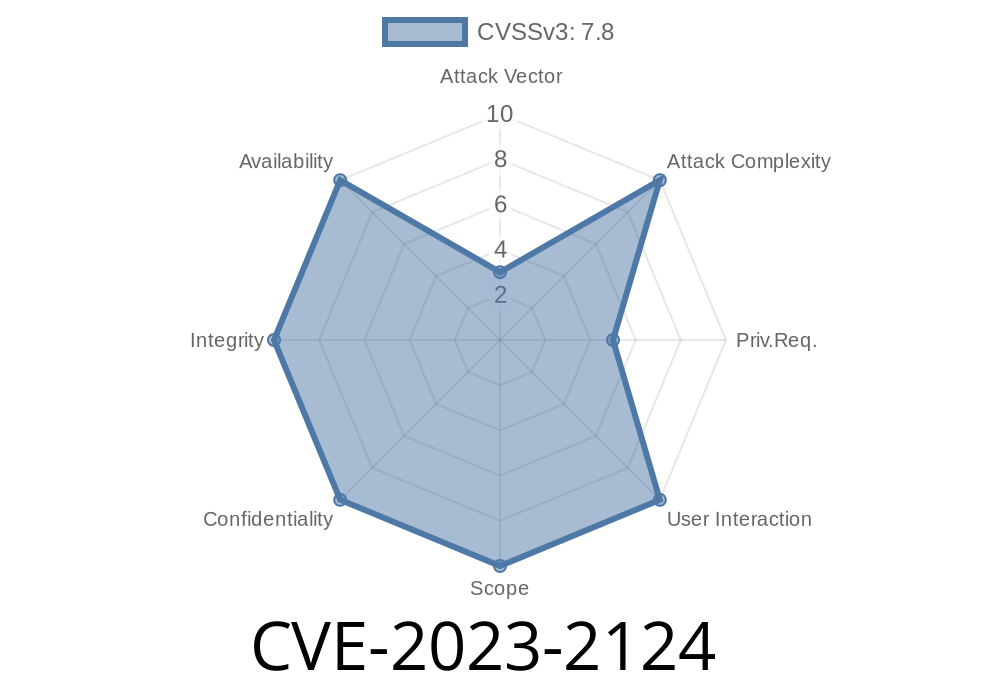The Linux kernel is the backbone of countless servers, desktops, and embedded devices around the world. As with any critical piece of software, security is vital. In April 2023, a new high-impact vulnerability was assigned: CVE-2023-2124. This vulnerability impacts the XFS file system, which is trusted for its scalability and reliability in demanding environments.
In this article, we’ll break down what CVE-2023-2124 is, how it works, who’s at risk, and walk through some sample code to help you understand the issue. We’ll also cover reference links and details on exploits—using simple, straightforward language.
What Is CVE-2023-2124?
CVE-2023-2124 is a security vulnerability in the Linux kernel’s XFS file system code. It relates to out-of-bounds memory access that happens when a user tries to restore an XFS image after a failure with a dirty log journal. Specifically, XFS’s journal replay function might access memory it shouldn’t, which can cause a crash (denial of service) or potentially allow a local attacker to escalate their privileges.
Where: Linux kernel’s XFS file system
- When: Found in early 2023 (Red Hat Red Hat bugzilla)
What Is “Out-of-Bounds Memory Access”?
Think of the computer’s memory as a row of lockers. Each program is only supposed to use certain lockers. Out-of-bounds access means a program is sneaking a peek (intentionally or not) into lockers it doesn’t own. This can lead to:
How Does XFS Replay Work?
XFS uses a journal log to track changes, so after a crash, it can “replay” the log to recover the file system. But if the log is dirty (meaning not cleaned after a crash), the code that replays the journal might not check boundaries correctly. This leads to reading or writing outside allowed memory.
The Flawed XFS Function
In XFS, one function gathers log entries for replay. If the log contains intentionally crafted (malicious) or corrupted data, the function can try to access or copy more memory than it should.
Here’s a simplified (and annotated) code snippet inspired by the real flaw
// Hypothetical vulnerable function in XFS log replay
int xfs_replay_log(struct xfs_log *log, struct xfs_mount *mp) {
int count = log->count;
struct log_entry *entries = log->entries;
// BAD: No check if 'count' is in allowed range!
for (int i = ; i < count; i++) {
process_log_entry(entries[i]);
}
return ;
}
What’s missing?
No check if "count" is too big. An attacker could craft a log journal with a huge count, making the function read WAY beyond the end of “entries”.
Attacker gets access to the system (for example, a regular user account).
2. Creates or modifies an XFS image with a dirty log journal, setting values likely to trigger the bug.
Restores the file system from this image, causing the XFS code to process the bad log journal.
4. XFS replay reads memory it shouldn’t, causing kernel crash or, in some cases, letting the attacker execute code as root.
Proof of Concept (PoC) Approach
While a full-use exploit can be tricky (and dangerous for your system!), the basic steps an attacker might use are:
1. Craft a disk image with a maliciously large log entry count (using tools like xfs_db or by binary editing).
Mount or cause the kernel to replay the corrupted journal.
3. Observe a kernel oops/crash, or probe for privilege escalation.
NOTE: Attempting to reproduce this can easily crash your system—do NOT try it on anything important!
Denial of Service: The most likely outcome is a kernel panic or crash—a denial of service.
- Privilege Escalation: An attacker may leverage the memory access to manipulate kernel data, possibly gaining root access. This is trickier but possible.
- Affected Systems: Any system using the Linux XFS file system, especially if users can restore file systems or interact with images.
Fixing and Mitigating CVE-2023-2124
Linux Kernel patches to check and validate log entries properly were proposed and merged shortly after the issue was reported. If you manage a Linux system, update your kernel to a version that fixes CVE-2023-2124.
Check your distribution’s advisories (e.g., Red Hat, Ubuntu, Debian)
- RHSA-2023:219 Security Advisory
- Debian Security Tracker
Reference Links
- CVE Details for CVE-2023-2124
- Red Hat Bugzilla (2189196)
- NVD Entry for CVE-2023-2124
- Debian Security Tracker
- XFS Project Home
Final Thoughts
Vulnerabilities like CVE-2023-2124 show just how critical “small” checks can be in system software. If you rely on XFS, patch your systems. And always treat disk images, backups, or journal logs from unknown sources with extreme caution.
If you want to explore more or try proof-of-concept exploits (in a controlled, testing environment), familiarize yourself with XFS internals, kernel debugging, and always use virtual machines—not production systems.
Security is all about the details—and CVE-2023-2124 is a powerful reminder.
Timeline
Published on: 05/15/2023 22:15:00 UTC
Last modified on: 06/05/2023 05:15:00 UTC
